2022 — Anniversaries of significance in Canada
The 50th anniversary of the 1972 Canada-Soviet Hockey Series (Summit Series)

Played in the Détente phase of the Cold War, the Summit Series of 1972 was an event consisting of eight hockey games between Canadian professionals and Soviet elite players. The series not only changed modern professional hockey, but also became a defining moment in Canadian culture. On September 28, 1972, Canadians across the country followed the final game, played in Moscow, on television and on the radio, and united in celebration when Paul Henderson scored the winning goal in the final seconds of the game. The Summit Series changed the corporate North American model, paving the way for Eastern Bloc players to play in the National Hockey League.
The 70th anniversary of Her Majesty Queen Elizabeth II’s accession to the Throne (Platinum Jubilee)
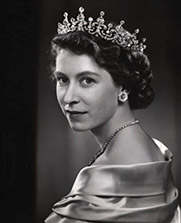
On February 6, 2022, and throughout the year, Her Majesty Queen Elizabeth II will celebrate her Platinum Jubilee, marking her 70th anniversary as Queen of Canada. The milestone will be celebrated across the Commonwealth and will be an opportunity for Canadians to learn about the role of the Crown in Canada, celebrate Her Majesty’s 70 years of steadfast service to Canada, and highlight Canadian achievements over the last seven decades. This is the first time in Canada’s modern era that a Canadian monarch, or any British monarch, celebrates a platinum jubilee.
The 75th anniversary of the adoption of the Canadian Citizenship Act
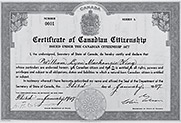
The Canadian Citizenship Act came into force on January 1, 1947, defining Canadian citizenship for the first time and supporting a sense of national identity. Before this Act came into force, people born in Canada and naturalized immigrants were “British subjects domiciled in Canada.” The Act also gave married women their own nationality, rather than assuming the nationality of their husbands. The Act has been amended several times, and the modern version of the law confirms that both Canadian-born and naturalized citizens are equally entitled to the rights of a citizen and are subject to the duties of citizenship. Today, over 1,700 citizenship ceremonies are held annually across various communities to formally welcome new citizens into the Canadian family.
The 150th anniversary of the birth of John McCrae
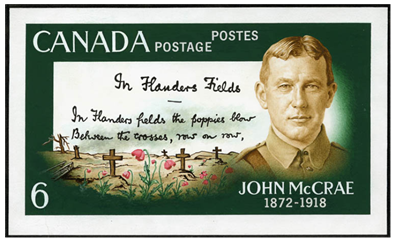
Born in Guelph, Ontario on November 30, 1872, Lieutenant-Colonel John McCrae is known for his poem “In Flanders Fields.” During the Battle of Second Ypres in April and May 1915, McCrae served as a surgeon who operated on wounded soldiers for almost two weeks straight. Amidst the shell craters and trenches, McCrae had noticed wild red poppies on the battlefields; these were the inspiration for his famous work. “In Flanders Fields” resonated as a martial poem during the war, with fallen soldiers imploring the living to keep up the fight. After the war, the poem came to symbolize the sacrifice of all those who fought in the First World War. The poem outlived John McCrae, who died on January 28, 1918, from pneumonia and meningitis. Today, people in Canada and around the world continue to recite “In Flanders Fields” on Remembrance Day to honour all who died in battle.
The 150th anniversary of the Nine Hour Movement and adoption of the Trade Unions Act
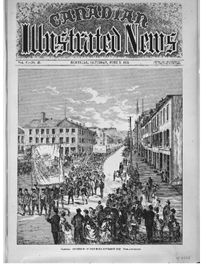
Between January and June 1872, workers around the world demanded shorter working hours to improve the quality of life for wage earners who often worked 10-hour days or more. The cause became known as the Nine Hour Movement. Union activity was illegal at the time, and the organizers of a large Nine Hour Movement strike in Toronto were arrested for criminal conspiracy. With labour issues gaining importance, Parliament passed the Trade Unions Act, legalizing the formation of unions. The movement was a unified protest that paved a way for the creation of unions.
The 175th anniversary of Irish Mass Immigration to Canada during the Great Famine in Ireland
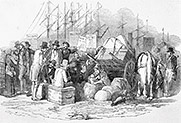
The Great Irish Famine of 1847 resulted in the death of over one million people, most from starvation, and incited over two million people to eventually emigrate from Ireland. In 1847, over 100,000 Irish sailed to Canada, although an estimated one in five did not survive due to harsh conditions on the ships. The destination for most of these ships was the port of Québec, where newcomers were required to stop at the quarantine island of Grosse-Île. Almost 5,000 Irish died on Grosse-Île, the island is the largest Irish burial ground outside of Ireland. Canada's most recent census lists the Irish as the fourth largest ethnic group in Canada. From their early settlements in Newfoundland in the 19th century, to their contributions in present-day Canadian society, Irish Canadians continue to flourish and celebrate their identity.
The 40th anniversary of the Canadian Charter of Rights and Freedoms
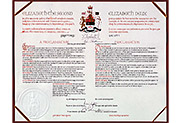
Proclaimed on April 17, 1982 by Her Majesty Queen Elizabeth II of Canada, the Canadian Charter of Rights and Freedoms marks its 40th anniversary in 2022. This foundational document has played an important role in addressing the inequalities of the country and has helped define the values of Canadians. The document is intended to ensure that all Canadians can live a life without discrimination of any kind. Section 25 of the document recognizes Indigenous rights, which have existed in Canada since long before the establishment of a colonial government structure.
The 50th anniversary of the Ugandan Asian resettlement
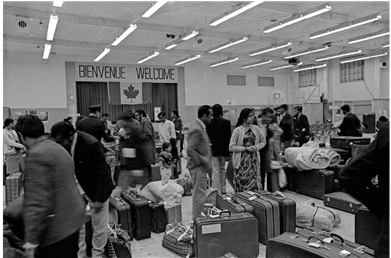
On August 4, 1972, the Ugandan Asian population of over 80,000 individuals was ordered to leave Uganda by President Idi Amin. Stripped of their Ugandan citizenship and lacking diplomatic representation in Uganda at the time, these individuals received assistance from a Canadian diplomatic team. Over 7,000 Ugandan Asians were granted refuge in Canada, representing one the earliest non-European refugee resettlement schemes undertaken by the Canadian government. This situation showed the importance of having a framework for a refugee crisis, which Canada has now developed.
The 50th anniversary of the Canadian Decorations for Bravery

Recipients of the Decorations for Bravery would never call themselves heroes, but that is what they are. The Decorations for Bravery were created to honour exceptional acts of selflessness in hazardous circumstances or situations of great peril. Since 1972, more than 4,000 Canadians have been recognized with the Cross of Valour, the Star of Courage or the Medal of Bravery for risking their lives to save the life of another. The Cross of Valour is the highest Canadian honour awarded to civilians.